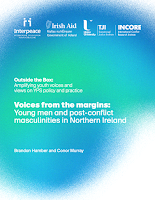Continuing our work on the issue of betrayal in peacebuilding Wilhem Verwoerd, Alistair Little and Brandon Hamber have published a new article in the Peacebuilding journal entitled “Beyond intragroup betrayal during intergroup relational peacebuilding”.
The article is open access and can be downloaded here.

This article addresses a neglected human cost of relational peacebuilding, identified in an earlier article on ‘peace as betrayal’. The focus here is how relational peacebuilders can respond to painful accusations of betrayal by family-type group members evoked by working with the ‘other side’. Continuing to draw on the reflections of experienced peace practitioners from South Africa, the Israel-Palestine region and the conflict in and about Northern Ireland, a contrasting distinction is made between two routes: a ‘clarification’ route that explains why working with ‘them’ is not a betrayal of ‘us’ vs a ‘counter-critique’ response that attempts to turn the traitor tables on the accusers. An evaluative discussion of the counter-critique route explores the pitfalls of political abuse, avoidance of shared responsibility and underestimating ‘thin’ relations (Margalit), as well as the complementary potential of the clarification and the counter-critique routes beyond peace as betrayal.















